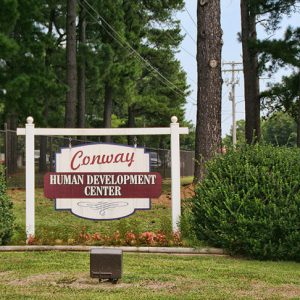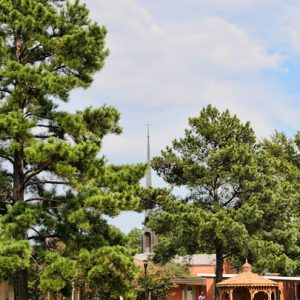calsfoundation@cals.org
Human Development Centers
From 1888 to 1959—prior to the creation of human development centers (HDCs)—the Arkansas State Hospital provided long-term care to individuals with intellectual disabilities as well as to individuals with severe mental illness. Arkansas lagged behind other states in development of facilities specializing in the care of the intellectually disabled. In the mid-1950s, plans were set in motion to develop a facility that would specialize in the treatment and education of children with intellectual disabilities. Within one year of the opening of the Arkansas Children’s Colony (later renamed the Conway Human Development Center) in 1959, the facility received accolades for its physical construction as well as for its progressive curriculum for residents. Soon after, several other Southern states were following in the footsteps of Arkansas by making preparations for their own children’s colonies. This was the launch of what would become the human development centers.
Human development centers as they exist today serve individuals with developmental disabilities. “Developmental disability” refers to the presence of severe and chronic impairments, typically present since birth or a very young age, that persist throughout a person’s life. Developmental disabilities may be mental, physical, or both. Specific areas of impairment may include serious challenges in day-to-day functioning such as caring for oneself, communicating, learning, being mobile, making decisions, living independently, and maintaining gainful employment.
The HDCs are state-run facilities overseen by the Division of Developmental Disabilities Services branch (DDS) of the Arkansas Department of Human Services (DHS). Each HDC provides twenty-four-hour residential, medical, and habilitation services. According to DHS statistics, more than 1,000 individuals were served in Arkansas HDCs in 2010. The primary concerns for the residents of the HDCs included intellectual disabilities/mental retardation, autism, cerebral palsy, and epilepsy. Additional concerns included residents with a dual diagnosis (co-occurring mental illness and mental retardation), challenging behaviors, fragile health, vision impairment, hearing impairment, and inability to walk. Of those individuals served in 2010, sixty-three percent were found to be functioning at the level of profound mental retardation.
As of August 2011, there were five operating human development centers in Arkansas. All of the Arkansas HDCs have demonstrated high standards of quality and service resulting in each earning accreditation by the Commission on Accreditation of Rehabilitation Facilities (CARF).
The Conway Human Development Center (CHDC) has been in existence since 1959, serving developmentally disabled individuals from across the state. The Conway HDC is the largest in Arkansas, with a maximum capacity of 616 residents. The Arkadelphia Human Development Center (AHDC) opened in 1968 and has the capacity to serve 134 adult residents. The majority of the residents served at AHDC are dually diagnosed. The Booneville Human Development Center (BHDC), previously a tuberculosis sanatorium, was officially opened as an HDC in 1973. The Booneville HDC has a capacity to serve 159 adult residents. The Jonesboro Human Development Center (JHDC) opened in 1974 and serves adult residents exclusively. The Southeast Arkansas Human Development Center (SEAHDC) opened in Warren (Bradley County) in 1978 and has the capacity to serve sixty-eight individuals age eighteen and older. The Conway HDC is the only center serving individuals under the age of eighteen, which appears to be reflective of recent changes in favor of providing home- and community-based services to minors with developmental disabilities.
The level of care provided to residents of the human development centers depends upon the individual needs and capabilities of each resident. While the HDCs each provide twenty-four-hour medical care and therapy services to their residents, slight differences exist in the services offered at each facility. Examples of services provided include speech therapy, physical therapy, occupational therapy, music therapy, psychological services, social services, and dietary evaluations. Specialized medical services such as dental, pharmaceutical, audiological, x-ray, and orthotic services are also made available depending on the center. Recreational and vocational services are strongly encouraged at all of the HDCs. All five Arkansas human development centers offer residents employment opportunities on the HDC campus or in the community.
Although the HDCs of Arkansas have demonstrated success in providing care to individuals with developmental disabilities, the Conway Human Development Center was the focus of legal scrutiny from 2002 to 2011. Complaints of alleged inadequate medical care, abuse of residents, and lack of proper supervision of residents were included in several lawsuits against the Conway HDC. As a result of the legal involvement, important changes have occurred in the way the Conway HDC provides care, safety, and educational services to its residents. Beginning in 2008, the Alexander Human Development Center, which opened in 1968, also underwent investigation of the way residential care was provided. Some allegations included physical abuse of clients, lack of immediate reporting of alleged abuse, and inappropriate prevention of physical injury to residents. Due to the discovery of inappropriate and insufficient care, the Alexander HDC was officially closed in June 2011.
In 2015, Disability Rights Arkansas issued a report recommending that, due to factors such as disrepair of aging buildings and a disproportionate use of restraints compared to what is seen at other HDCs, the Booneville facility be closed, with residents either transferred to home care or sent to one of the other HDCs. In 2020, regulators had flagged the Booneville and Conway centers for using physical restraints in such a way as to endanger clients. A report released by Disability Rights Arkansas on November 26, 2025, alleged “systemic failures in nutrition management and clinical oversight that places residents” of the Conway Human Development Center “at significant and ongoing risk of harm and death.” Specifically, the organization alleged that meals were inadequate for the nutritional needs of residents, resulting in multiple hospitalizations related to malnutrition.
For additional information:
“Arkansas Department of Human Services 2010 Statistical Report.” Arkansas Department of Human Services. https://humanservices.arkansas.gov/wp-content/uploads/ASR-2010.pdf (accessed January 20, 2022).
Arkansas Governor’s Developmental Disability Council. http://www.ddcouncil.org/ (accessed January 20, 2022).
Division of Developmental Disabilities Services, Arkansas Department of Human Services. https://humanservices.arkansas.gov/divisions-shared-services/developmental-disabilities-services/ (accessed January 20, 2022).
Shores, Elizabeth F. “The Arkansas Children’s Colony at Conway: A Springboard for Federal Policy on Special Education.” Arkansas Historical Quarterly 58 (Winter 1996): 408–434.
Jessica L. W. Duffel
Little Rock, Arkansas
Hillary R. Hunt
Little Rock, Arkansas






Comments
No comments on this entry yet.